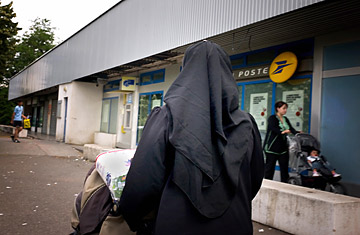
A Muslim woman wearing traditional clothes in France
Are European societies anti-Islam? That's a question more people are asking in the wake of Switzerland's referendum to ban the building of minarets in the Alpine country. Almost 6 out of 10 Swiss voters supported the ban — charges of racism be damned. France passed a law in 2004 that bans young women from wearing Islamic headscarves in public schools, and has now joined the Netherlands in debating a ban on full-body coverings like a burqa. And Muslims in multicultural Britain have also repeatedly accused officials there of talking down to them with urges to drop clothes that 'form a barrier' between them and mainstream society.
But while these controversies attract attention, there are also efforts to work out solutions to living with religious differences in Europe. Take a recent book by French anthropologists Dounia and Lylia Bouzar, Is There Room for Allah in the Workplace? The book offers legal guidelines on how work-religion conflicts might be examined, as well as practical suggestions on resolving them. "Paradoxically, as the question of the visibility of religious practice crops up regularly in the media, it remains a total haze in the professional world," the book notes.
Previous research indicates that almost a third of French companies are grappling with how to respond to requests from Muslim employees for prayer breaks, Islamic holidays, halal options on cafeteria menus and adapting work assignments to take into account the effects of fasting during the holy month of Ramadan. In their study, which involved over 350 interviews with employees and managers from dozens of companies, the Bouzars found most bosses have tended to improvise reactions to such demands, producing two contrasting excesses. "Managers have tended to either adopt laxity, reasoning 'We've got to accept their differences and avoid perceptions of Islamophobia,'" says Dounia Bouzar, who has previously written several sociological studies of Muslims in France. "Or [they've] exhibited excessive rigidity by replying, 'We've got to help these people to evolve beyond their archaic beliefs by imposing strict secularity at work.'"
The problem, Dounia Bouzar says, is that "those are two sides of the same coin that only reinforce divisive stereotypes. Rather than subjective attitudes or sensibilities, pragmatism should prevail in determining whether individual religious observance is compatible with professional objectives."
So what happens when Muslim employees ask for a prayer area at work? Or when a female staffer wants to wear a headscarf while representing her firm to clients? Or a devout male staffer refuses to shake hands with or meet with women colleagues? First, the authors stress, bosses should deal no differently with religious demands from Muslim workers than with those from Christian, Jewish or Buddhist staff. "Evaluate Mona as you would Martine," Dounia and Lylia Bouzar write.
The authors also tell bosses "the question you mustn't ask is 'What does your religion say?'" since answers to that will likely be subject to interpretation, and in any case aren't relevant to the work setting. Instead, the study recommends managers analyze how a request will affect objective professional considerations on a series of measures: security, hygiene, performance ability, organization and business interests, as well as the risk of religious employees engaging in proselytizing (or appearing to do so) through their expression of faith. If the impact is small, then a boss should agree to the request. If it's likely to cause a lack of productivity or lead to workplace disputes, then you should probably say no once you've checked labor-law requirements.
Case studies include that of a multinational cosmetics firm that decided to hire a highly qualified international marketing executive who interviewed in a headscarf — "from Hermès, but a headscarf nonetheless," the book notes — despite reservations about the covering censoring her own beauty. Another details the case of an airport-security company that dismissed a male employee who walked out of meetings to pray and refused to interact with women. One of those situations was ultimately judged acceptable, while the other was deemed disruptive enough to justify dismissal — and it isn't difficult to see which was which. But that's the Bouzars' point: if France can avoid controversy over Islam and stick to common sense, life and work in the country with Europe's largest Muslim population will get a lot easier for everyone.
